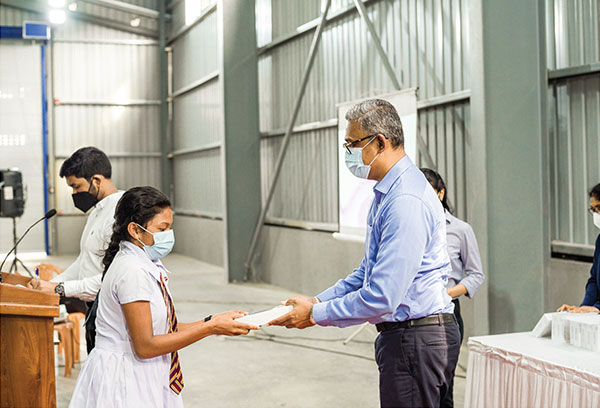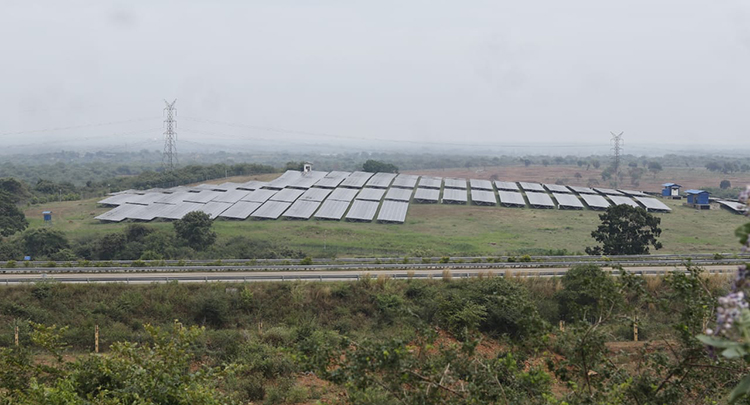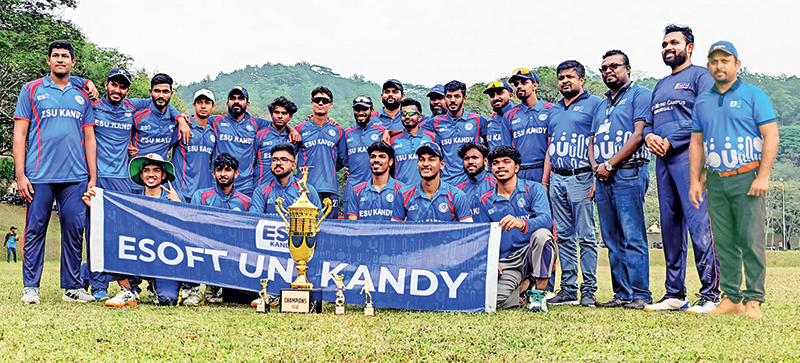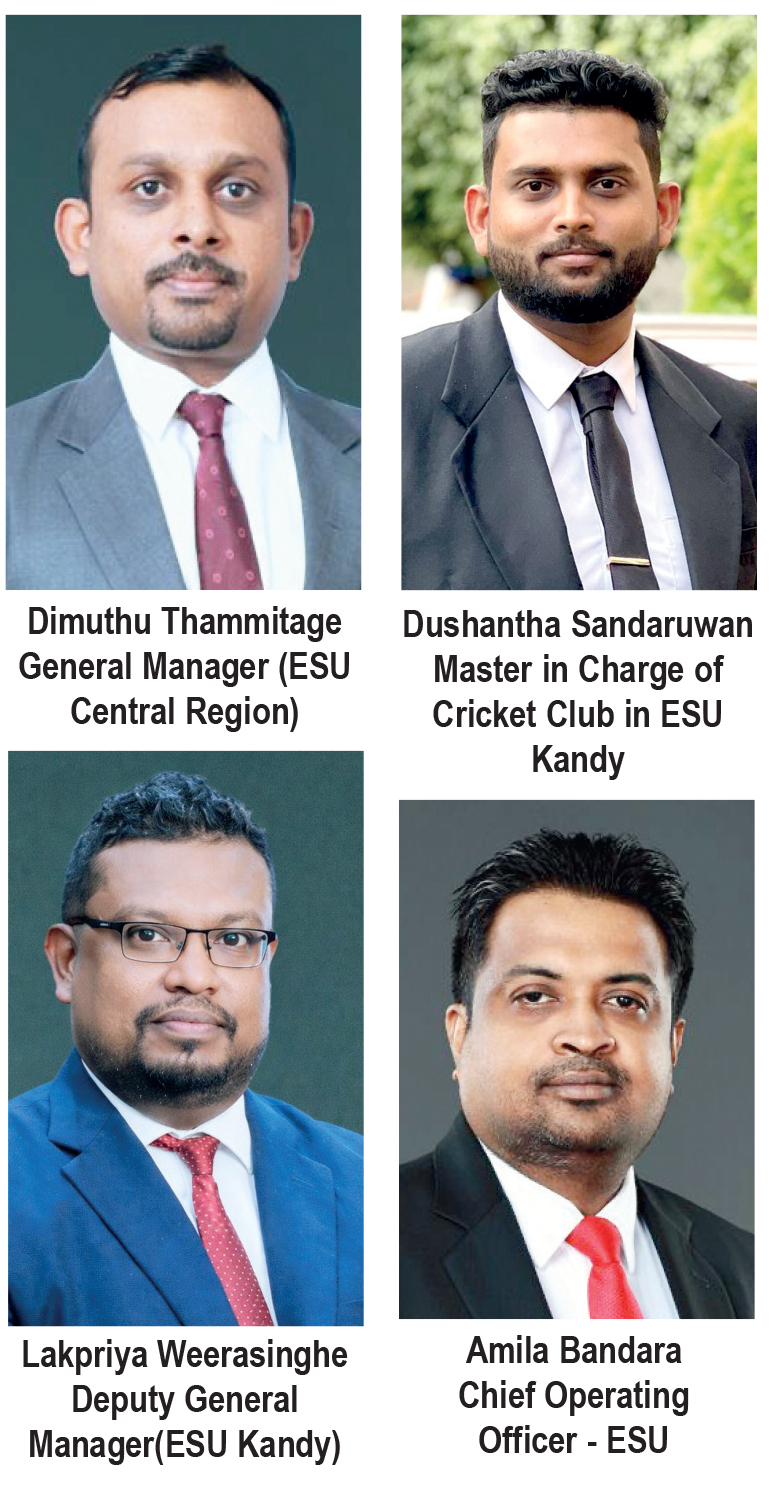Business
John Keells launches Digital Learning Initiative to support online education of school children

John Keells Foundation (JKF) launched the pilot of John Keells Praja Shakthi Digital Learning Initiative on 11th November 2021 in Ranala. As a medium-term response to the COVID-19 pandemic, the project aims to facilitate online based learning of disadvantaged school children who are preparing for public examinations in the midst of the pandemic and mitigate the increase in inequalities in accessing educational opportunities.
The pilot project involves the distribution of a total of 100 Samsung A8 tabs and data packages to selected O’Level and A’Level students in John Keells Praja Shakthi locations in Colombo 2 and Ranala for the duration of the respective course of study. JKF is partnered in this initiative by Deutsche Bank as co-funder and John Keells Office Automation (JKOA) and Dialog Axiata PLC as suppliers of devices and data packages respectively at concessionary rates. Elephant House was the logistics partner for the Ranala event.
During the simple event held at the Elephant House Factory in Ranala in compliance with COVID-19 protocols, 50 tabs were distributed to selected O’Level students from four government schools, namely, Dedigamuwa K.V, Dewamitta M.V, Munidasa Kumarathunga Vidyalaya and Philip Thilakawardhane M.V.
Addressing the gathering, JKF’s Head of Operations, Ms. Carmeline Jayasuriya said, “John Keells Foundation decided to initiate this project taking into account the numerous hardships faced by school children, especially in examination years, to pursue their education amidst the pandemic including school closures and the challenges in accessing online education due to the unaffordability of devices and data. We are delighted to be partnered by responsible corporates such as Deutsche Bank, JKOA and Dialog Axiata in this pilot initiative. Whilst all of us consider this as an investment on the education of our youth, we firmly hope that you, the beneficiary students, will optimize this opportunity to pursue your educational endeavours responsibly.”
The event was also graced by Chathura Mihidum, Divisional Secretary, Kaduwela, Ms. Anuradha Samarakoon, Divisional Education Director, Ranala, Daminda Gamlath, John Keells Group President – Consumer Foods, Sanjeewa Jayasundara, CCS’ Head of Operations – Supply Chain, Pasan Jayasinghe – Vice President Deutsche Bank and Harsha De Zoysa – Senior Sector Manager, Large Enterprise, Dialog Axiata PLC.
The distribution to Colombo students took place on 22nd November at Cinnamon Grand, the logistics partner for the event.
The project is designed so that tabs will be re-pooled after the completion of the recipients’ study course to benefit another cohort of deserving students. To ensure the due use of the device and enhance the impact of this intervention, JKF will be monitoring the educational progress of the students through the school principals as well as backend mechanisms.
John Keells Praja Shakthi is a sustainable community empowerment project initiated by JKF in and around the John Keells Group’s business locations through strategic interventions. The multistakeholder collaboration on the new project is a testament to the strength of partnerships in empowering communities through sustainable initiatives.
Education is one of the six focus areas of John Keells Foundation – the CSR entity of John Keells Holdings PLC (JKH), a company listed in the Colombo Stock Exchange operating over 70 companies in 7 diverse industry sectors. With a history of over 150 years, John Keells Group provides employment to over 14,000 persons and has been ranked as Sri Lanka’s ‘Most Respected Entity’ for the last 16 Years by LMD Magazine. Whilst being a full member of the World Economic Forum and a Participant of the UN Global Compact, JKH drives its CSR vision of “Empowering the Nation for Tomorrow” through John Keells Foundation and through the social entrepreneurship initiative,
‘Plasticcycle’, which is a catalyst in significantly reducing plastic pollution in Sri Lanka.
Business
Lanka’s largest solar park set to transform energy landscape and local economy in Hambantota

A new era in Sri Lanka’s renewable energy is unfolding in the Gonnoruwa Division of Hambantota District, where construction has begun on the country’s largest solar power park. Spanning 450 acres and designed to generate 150 megawatts (MW) of electricity, the US$150 million private-sector-led project is poised to become a cornerstone of the nation’s sustainable energy ambitions.
Officials say the solar park, guided by the Sustainable Energy Authority and the Mahaweli Authority, will make its first contribution to the national grid by the end of this year, with full capacity expected by 2026. Once completed, the facility will rank among Sri Lanka’s largest renewable energy installations, second only to the 210 MW Victoria Dam and the 150 MW Upper Kotmale hydropower project.
The initiative is being framed as a strategic response to recurring power cuts in the Southern Province during annual drought periods. With a projected 20% contribution to the country’s daytime electricity demand, the solar park is expected to significantly stabilize the grid, reduce reliance on fossil fuels, and contribute to the country’s renewable energy targets.
Project Engineer Thilanka Bandara confirmed that preliminary land preparation and boundary works have been completed, with 50 MW already feeding into the national grid. The investment, fully funded through foreign direct investment, local bank loans, and equity capital, requires no government funding. Two private firms are sharing the development, contributing 70 MW and 80 MW respectively.
Bandara highlighted a unique feature of the project: the transmission infrastructure, estimated at US$16 million, is entirely financed by the investors, marking a departure from conventional grid-connected projects. The park will also employ state-of-the-art ground-mounted solar technology, considered the most advanced currently deployed in Sri Lanka.
In a first for Sri Lanka, the solar panels will be installed five feet above the ground, allowing partial-shade crops to be cultivated underneath. Technical Officer Sithmina Bandara explained that this setup will enable the cultivation of food plants such as mushrooms, which thrive in shaded conditions, creating a model for integrated solar-agriculture systems. Agricultural experts have already provided guidance on implementing this initiative, which combines energy production with local food security.
The project is expected to generate 750 to 1,000 direct and indirect jobs, with 400–500 already employed in the initial phase. Long-term maintenance work will provide further employment opportunities, offering a substantial economic boost to the Hambantota region. Environmental management measures are also in place to prevent elephants from entering nearby villages, ensuring harmony between development and wildlife.
All necessary approvals and permits were obtained by February 2025, aligning the project with the Ceylon Electricity Board’s national generation plan. Officials confirmed that upon completion, the total output of the Solar Energy Park will rise to 200 MW, combining existing installations with the new 150 MW facility.
Experts say the Hambantota solar park represents more than just a power generation project. Its innovative design, private-sector financing, and integrated agricultural approach position it as a template for future renewable energy projects in Sri Lanka, reflecting a new model of sustainable development that balances energy, economy, and environment.
By Sirimanta Ratnasekera
Business
ESU Kandy clinches dominant victory at ‘Battle of Esoftians’

The Battle of Esoftians, an annual cricket encounter organized by ESOFT Uni Kandy, concluded with a spectacular display of cricketing prowess as the Kandy team secured a massive 245-run victory over ESOFT Metro Campus, Kurunegala. The match was held on the 15th at the University of Peradeniya Grounds.
Winning the toss and electing to bat first, the ESOFT Uni Kandy batsmen dominated the field from the outset. They showcased an explosive batting performance, posting a formidable total of 280 runs for the loss of 5 wickets in their allotted 20 overs.
In response, the Kurunegala ESOFT Metro team struggled against a disciplined bowling attack. The Kandy bowlers dismantled the opposition’s batting lineup, bowling them all out for a mere 35 runs, sealing a historic win for the Kandy campus.
The event was graced by the presence of key officials from the ESOFT management: Amila Bandara – Chief Operating Officer (ESOFT Uni), Dimuthu Thammitage – General Manager (Central Region), Lakpriya Weerasinghe – Deputy General Manager, ?Lahiru Diyalagoda
Centre Manager-Degree Division, ESOFT Metro Campus Kurunegala and Dushantha Sandaruwan – Master in Charge (ESU Kandy Cricket Club)
Team Lineups
ESOFT Uni Kandy (Winners)
Chamath Ekanayake (Captain), Dinuka Tennakoon (Vice Captain), Dushantha Sandaruwan (MIC), Chalitha Rathnayake, Pulasthi Bandara, Isuru Dehigama, Kesara Nuragoda, Aadhil Sherif, Isuru Pannala, Achintha Medawatta, Ahamed Shukri, Gowtham Hari Dharshan, Danushka Sahan, Eranda Bandara, and Damith Dissanayake.
ESOFT Metro Campus Kurunegala (Runners-up)
Adeesha Samarasekara, Savishan Madusha, Lahiru Diyalagoda, Hirun Damayantha, Naveen Madushanka, Daham Pothuwewa, Senuda Thewnaka, M.R. Abdulla, Arunodya Dasun, Mohamad Afri, Desith Perera, Lasitha Ranawaka, Anton Dilon, Shenuka Thirantha, and Kavindu Bandara.
Text and Pix By S.K. Samaranayake
Business
HNB joins Royal–Thomian “Battle of the Blues” as official banking partner

HNB PLC, Sri Lanka’s leading private sector bank, has joined as the Official Banking Partner for the 147th edition of the historic “Battle of the Blues,” the Royal–Thomian cricket encounter between Royal College, Colombo, and S. Thomas’ College, Mt. Lavinia. Commenting on the partnership, HNB’s Managing Director/CEO Damith Pallewatte highlighted the bank’s long-standing connection with cricket, including sponsorship of Sri Lanka’s first Test match against England in 1982, and emphasized HNB’s commitment to nurturing young talent and promoting school cricket. The three-day clash for the Rt. Hon. D. S. Senanayake Memorial Shield will take place from March 12–14 at the SSC Grounds, with the Mustangs Trophy one-day match following on March 28 under lights. HNB’s inaugural involvement marks a milestone in the bank’s sports marketing journey, strengthening its role in the school cricket ecosystem. The bank will enhance the spectator experience by introducing digital and cashless banking solutions, modernizing the event while preserving its rich heritage and sporting tradition.
-

 Business6 days ago
Business6 days agoMinistry of Brands to launch Sri Lanka’s first off-price retail destination
-

 Latest News2 days ago
Latest News2 days agoNew Zealand meet familiar opponents Pakistan at spin-friendly Premadasa
-

 Latest News2 days ago
Latest News2 days agoTariffs ruling is major blow to Trump’s second-term agenda
-

 Latest News2 days ago
Latest News2 days agoECB push back at Pakistan ‘shadow-ban’ reports ahead of Hundred auction
-

 Features6 days ago
Features6 days agoGiants in our backyard: Why Sri Lanka’s Blue Whales matter to the world
-

 Sports3 days ago
Sports3 days agoOld and new at the SSC, just like Pakistan
-

 News5 days ago
News5 days agoIMF MD here
-

 News2 days ago
News2 days agoConstruction begins on country’s largest solar power project in Hambantota














